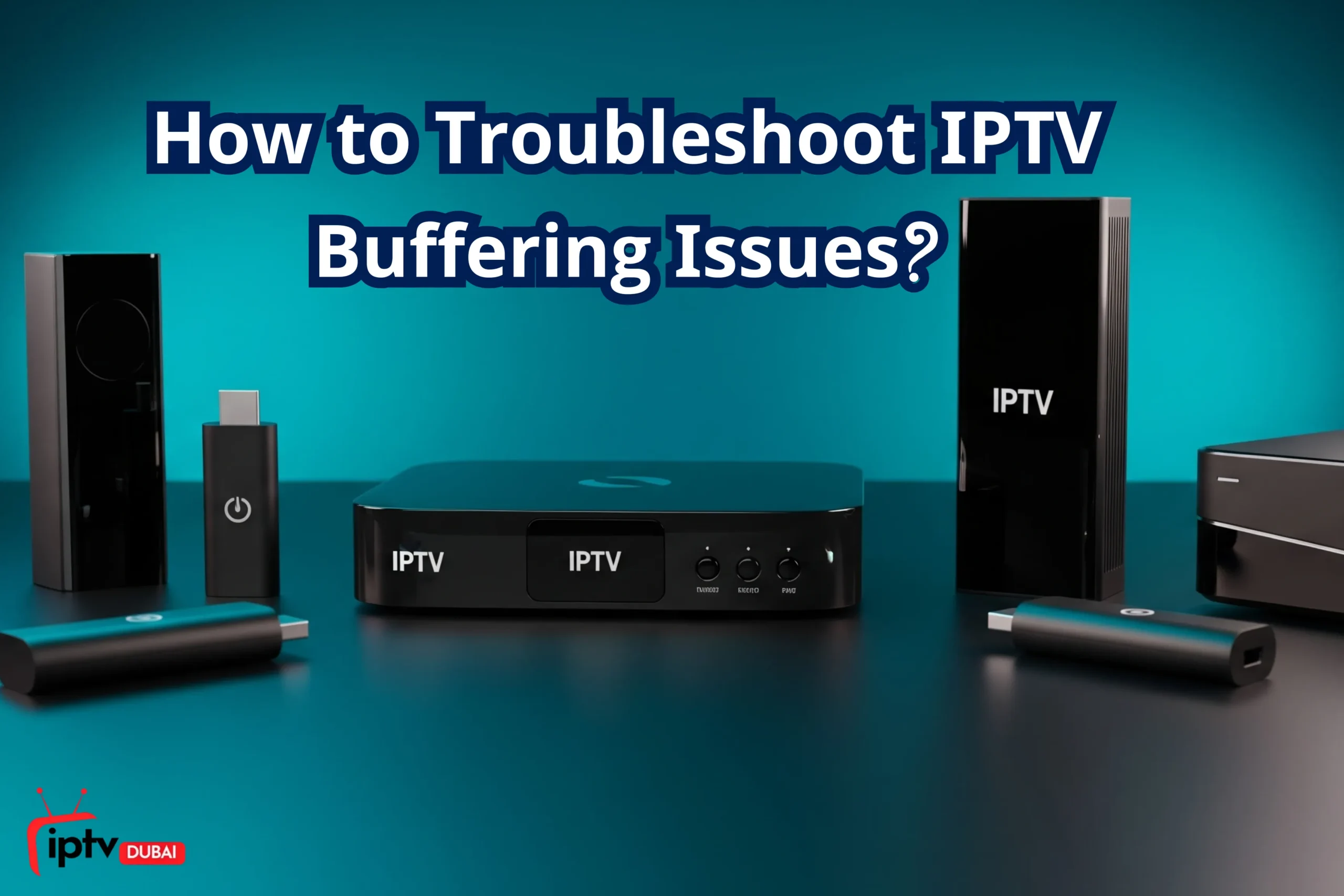Blog
How to Troubleshoot IPTV Buffering Issues

If you’re a fan of IPTV, you know how frustrating buffering can be. Whether you’re watching your favorite sports event, a new show, or enjoying movies, frequent interruptions ruin the experience. In this guide, we’ll walk you through troubleshooting IPTV buffering issues and offer actionable solutions for smoother streaming.
Buffering occurs when data cannot be downloaded fast enough to keep up with the video being played. Fortunately, there are several ways to resolve these issues and get your IPTV running at optimal speed. As a trusted source of IPTV support in Dubai, IPTVDUBAI.NET ensures that you have access to reliable and up-to-date information.
Let’s dive into the common causes of IPTV buffering and explore how to fix them.
Common Causes of IPTV Buffering
Before diving into solutions, it’s essential to understand what causes buffering in the first place. By knowing the root causes, you can target the issue more effectively.
1. Slow Internet Connection
A slow or unstable internet connection is the most common cause of buffering. IPTV services require a consistent, high-speed internet connection to stream content without interruption.
- Recommended speed for IPTV: 10 Mbps for HD quality and at least 25 Mbps for 4K streaming.
- How it causes buffering: Insufficient bandwidth leads to lag in data transmission, causing the video to pause and buffer as it waits for more data.
2. Weak Wi-Fi Signal
If you’re using Wi-Fi instead of a wired Ethernet connection, your signal strength can fluctuate, causing interruptions in streaming.
- How it causes buffering: A weak Wi-Fi signal can drop packets of data, causing delays in streaming.
3. Device Overload
Sometimes, the problem isn’t your internet connection but the device you’re using to stream IPTV. Running multiple apps, having several tabs open, or using outdated hardware can slow down the device’s performance.
- How it causes buffering: The device struggles to process high-bandwidth IPTV streams, resulting in stuttering or freezing.
4. Outdated IPTV Software
IPTV apps, like any other software, need regular updates to function smoothly. If you’re using outdated IPTV apps or firmware, you might face buffering and other streaming issues.
- How it causes buffering: Outdated software may not be optimized for newer technologies or streaming protocols, causing poor performance.
5. Network Congestion
If other devices on your network are consuming a significant amount of bandwidth (e.g., downloads, video calls), your IPTV stream will struggle to get enough bandwidth, causing buffering.
- How it causes buffering: A crowded network divides the available bandwidth, leading to slower data transmission to your IPTV device.
Step-by-Step Guide to Troubleshoot IPTV Buffering Issues
Now that we understand the common causes of IPTV buffering, let’s dive into actionable solutions. These steps will help you troubleshoot and resolve buffering issues for smoother viewing.
Step 1: Check Your Internet Speed
The first step is to verify that your internet connection meets the requirements for IPTV streaming. You can use a speed testing tool like Speedtest.net to check your download and upload speeds.
- How to do it: Run a speed test on the device you’re using for IPTV.
- For HD streaming, your speed should be at least 10 Mbps.
- For 4K streaming, aim for speeds over 25 Mbps.
- For HD streaming, your speed should be at least 10 Mbps.
If your speed is below the recommended threshold, contact your internet service provider (ISP) to upgrade your plan or troubleshoot the connection.
Step 2: Switch to a Wired Connection
If you’re on Wi-Fi, try switching to a wired Ethernet connection. This will provide a more stable and faster connection for IPTV.
- Why it works: Ethernet connections are less susceptible to interference, providing a consistent bandwidth for smooth streaming.
- How to do it: Plug an Ethernet cable directly into your device (e.g., smart TV, PC, or set-top box) from your router.
If you can’t use a wired connection, consider moving your router closer to your IPTV device or investing in a Wi-Fi range extender.
Step 3: Close Unnecessary Apps and Devices
If you’re experiencing buffering on a device that’s running multiple applications or tabs, close everything that isn’t essential for streaming.
- Why it works: Running too many applications consumes device resources and bandwidth, leading to slow streaming.
- How to do it: On a smart TV, close all unused apps. On a PC or streaming box, ensure no background applications or downloads are taking up bandwidth.
For devices like Roku or Apple TV, check the storage and ensure that apps aren’t running in the background.
Step 4: Update Your IPTV Software
If your IPTV application or device firmware is outdated, it could be causing performance issues. Check for updates in the settings of your IPTV app or the device’s system.
- Why it works: Software updates often include bug fixes, security patches, and performance enhancements that can resolve buffering issues.
- How to do it:
- On apps like VLC, check the app store for updates.
- For set-top boxes like MAG or Formuler, check the manufacturer’s website for firmware updates.
- On apps like VLC, check the app store for updates.
Step 5: Optimize Network Traffic
If you have multiple devices using the internet at the same time, such as phones, tablets, or computers, this can cause network congestion and slow down your IPTV.
- Why it works: Limiting the number of devices using the internet at once ensures that IPTV gets the bandwidth it needs for smooth playback.
- How to do it:
- Pause or stop large downloads or streams on other devices.
- Use Quality of Service (QoS) settings on your router to prioritize IPTV traffic over other uses.
- Pause or stop large downloads or streams on other devices.
Step 6: Adjust Video Quality Settings
If your internet speed isn’t quite up to par for HD or 4K streaming, consider lowering the video quality settings in your IPTV app.
- Why it works: Lowering the quality reduces the bandwidth required for streaming, leading to fewer buffering interruptions.
- How to do it: Most IPTV apps allow you to adjust video quality. Look for settings like 480p or 720p if you’re experiencing buffering on higher-quality settings.
Step 7: Check for Server Issues
If none of the above solutions work, the problem might lie with the IPTV service provider. Sometimes, the issue could be on their end, especially during peak hours.
- Why it works: Server-side issues can cause slow streaming speeds or disruptions in service.
- How to do it: Check the provider’s website or customer support for any announcements about server maintenance or outages. Some providers also offer speed test tools for their servers.
Step 8: Contact Your IPTV Provider
If all else fails, reach out to your IPTV provider for support. They might have specific troubleshooting steps or be able to identify any issues on their end.
- Why it works: Professional customer support can diagnose issues that might be specific to your device or network.
- How to do it: Contact customer support via email, phone, or live chat for assistance. They may offer guidance or suggest a plan upgrade if your current service doesn’t support smooth streaming.
Preventing Future IPTV Buffering
While the solutions above will help fix IPTV buffering, prevention is always better than cure. Here are some tips to avoid buffering in the future:
- Maintain a Strong Internet Connection: Ensure your internet speed meets or exceeds the IPTV provider’s recommended bandwidth.
- Upgrade Your Equipment: Use the latest routers, devices, and cables to ensure the best performance.
- Check for Software Updates Regularly: Keep your IPTV app and device firmware up-to-date to avoid potential issues.
- Use a VPN: A VPN can bypass throttling by ISPs, especially during peak hours when bandwidth is limited.
Conclusion
Buffering is a common issue for IPTV users, but with the right troubleshooting steps, you can ensure smooth and uninterrupted streaming. Whether it’s optimizing your internet connection, adjusting device settings, or updating your software, each of these steps will help you enjoy a seamless viewing experience.
As always, for those in Dubai looking for high-quality IPTV services and troubleshooting tips, IPTVDUBAI, your trusted online vape and tech store based in Dragon Mart, is here to help. If you’re facing any issues with your IPTV setup, visit us for expert guidance and premium products.







